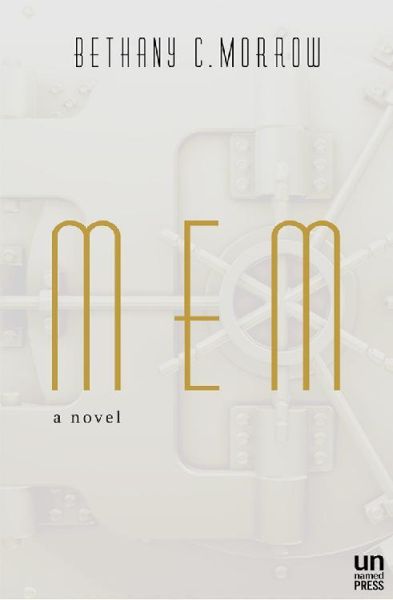Ghost of You
Mem
By Bethany C. Morrow

3 Dec, 2021
0 comments
Bethany C. Morrow’s 2018 Mem is a stand-alone historical science fiction novel.
Professor Toutant’s marvelous invention liberated the wealthy from the burden of unpleasant memories. A simple visit to the professor’s Montreal facility — the Vault — and one’s trauma can be off-loaded to an another being. Now relieved of the memory, the rich can go their way, while their Mem remains in the Vault.
Despite appearances, Mems are not people. They are automatons, who will reenacting a moment in time over and over until entropy claims them. The single exception is Dolores Extract No. 1.
A very early product of the process, Dolores Extract No. 1 seems to be a real person. She is not trapped in a brief cycle of recapitulation. Instead, she can form new memories and also envision and carry out new objectives. The only hint that she is not the young woman she seems to be is her immunity to time: she looks exactly the same in August of 1925 as she did when she was created in 1906.
At first, Dolores Shepherd and her family were proud of Dolores Extract No. 1. After all, Miss Shepherd was the Source of Dolores’ original memories and possibly the reason that Dolores Extract No. 1 was so much like a person. But it soon became clear that this was a fluke. Dolores Extract No. 2 and all the Extracts who followed were perfectly conventional Mems. Once it became obvious that Dolores Shepherd wasn’t the reason that Extract No. 1 was special, the Shepherds turned their back on Dolores Extract No. 1, leaving Dolores Extract No. 1 free to enjoy life as an independent being.
Now, however, the Shepherds have a use for Dolores Extract No. 1. Repeated use of the process turns out to have had unfortunate side-effects. Rather than a perfectly happy, perfectly tranquil personality, people who edit out too many memories get a bit ragged around the edges, become befuddled and confused. What use discarding unpleasant experiences if the person who results is non-functional?
Happily, here the professor’s endless genius can offer hope. What was pared away can be reprinted. Whether reprinting is sufficient seems unclear. However, it might be a cure, which is enough reason for the wealthy patrons or their worried families to try it.
The reprinting process destroys the Mem. Since Mems are not persons, this is an acceptable sacrifice. From the POV of Dolores Extract No. 1, giving up her life to her source is not an acceptable sacrifice. But … Mems have no legal rights. The Mem’s only hope of a reprieve is to present a convincing case that she deserves life to the Shepherds. Whose self-interest will surely lead them to reject the pleas of Dolores Extract No. 1.
~oOo~
It is just as well this process is treated as a toy for the well-to-do. Imagine to what purpose Beria could have put the professor’s technology.
There are two mysteries here1. What could possibly inspire a rich person to mercy? What makes Dolores Extract No. 1 so special? Both questions are answered.
Modern readers familiar with Montreal only as a community somewhat beyond Greater Toronto’s eastern-most borders may be interested to know that at the time the story is set, Montreal was the queen of Canadian cities. It would not lose that position until about 1980, thanks to years of Herculean effort on the part of Rene Levesque and other objectively pro-Toronto stalwarts in the Parti Quebecois.
Modern readers may also be surprised to learn that Dolores Extract No. 1 is denied legal standing as a person. In fact, Canada in the 1920s was quite prone to refusing to recognize full legal personhood on the flimsiest of pretexts. Indeed, women in general would not be deemed legal persons in Canada until 18 October 1929. Even after the Judicial Committee of the Privy Council handed down its decision, there were many subsets of the category women who were denied full rights.
Also true to the setting: the professor and a few others are somewhat bothered by the fact that the benefits of Mems are limited to the wealthy; the poor must cope unaided with their accumulated traumas. Is anything to be done? Not really, as extending the process to the poor would cost money. However, the professor and the others worried by this issue can at least console themselves that they are good to have least recognized the issue. And of course, as it turns out. the unpleasant side-effects of his process are limited to the rich2.
While I scratch my head about certain world-building choices, Morrow’s prose and characterization are adept and the story the author weaves about memory and the hazards of easy solutions is fast-paced3 and engaging.
Mem is available here (Amazon US), here (Amazon Canada), here (Amazon UK), here (Barnes & Noble), here (Book Depository), and here (Chapters-Indigo).
1: That are resolved, I mean. You may have questions about Vault logistics and the exact nature of the Mems. These are not really answered.
2: Early in the 20th century there was an expert-approved fashion to toughen up children by keeping them on a strict schedule and doling out affection in minute quantities. The children so raised were prone to various physical and metal afflictions. But it was only the well-to-do and educated who succumbed to this fad and crippled their kids. The ignorant poor, knowing no better, would actually pick up and cuddle their children.
3: I’ve seen this work referred to as a novella, but it’s as long as novels were back when novels cost 75 cents.
